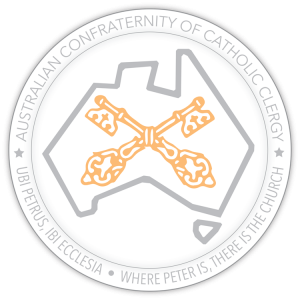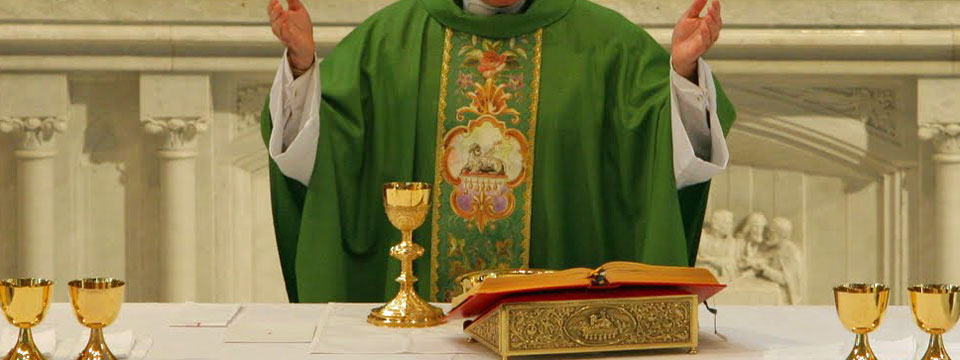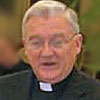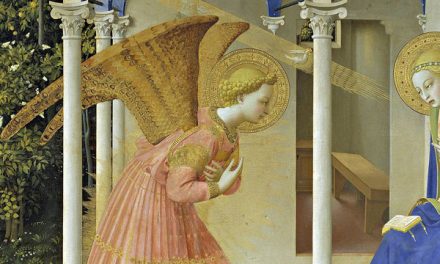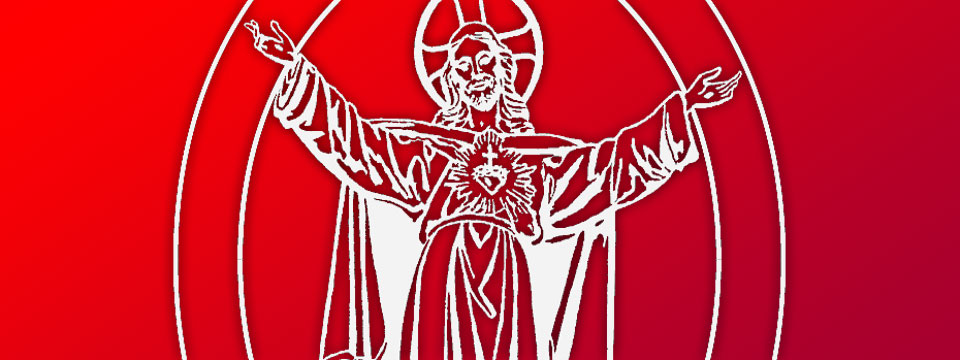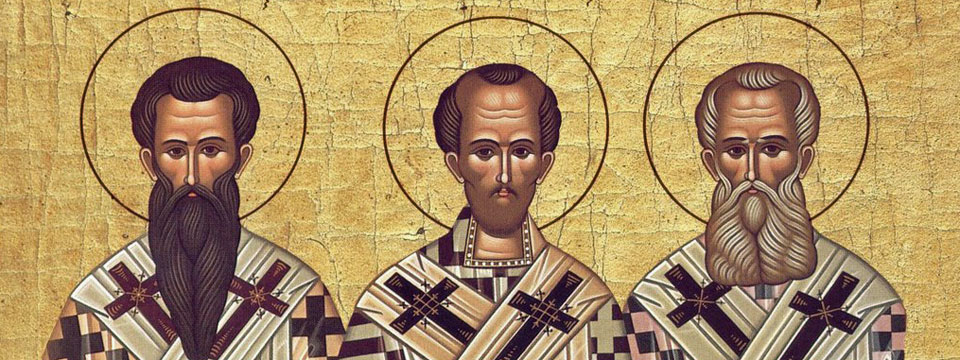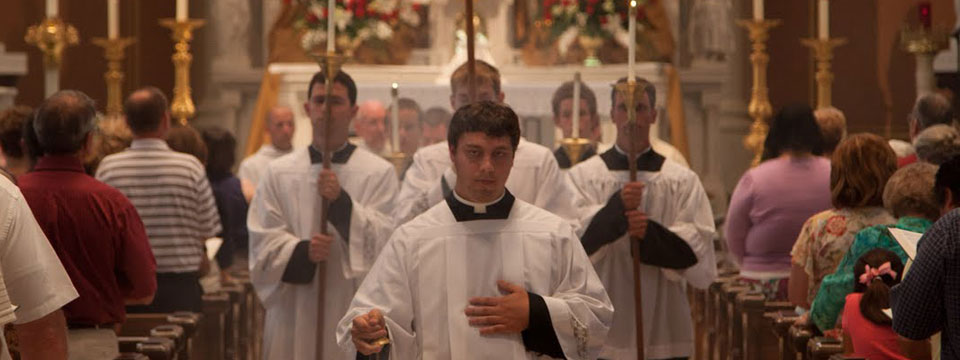Introductory remarks
Having had the honour of previously addressing some members of this august body in Perth, Australia, a number of years ago, it is a distinct privilege to address you, in a more international grouping, “sub umbra Petri”, here in the Eternal City of Rome.
We meet during the “Year for Priests” established by the Holy Father to help us, as priests wherever we may be, to refurbish our personal contact with the spiritual realities that guide us through this world, to help us persevere in our vocations and to, one might say, recalibrate our navigational instruments setting them clearly on the Persona of Christ and emulate His Faithfulness so that we may truly represent Him in this, our moment of History and thus be faithful ministers of His Gospel to His Holy People.
If such a year is necessary, are we in trouble then, as priests, have we lost our way? A question to be pondered.
Constant need for reform
I rather like to think of us as being a part of the “Ecclesia semper reformanda” and thus the constant need for recalibration is seen as being part and parcel of the “normal” priesthood – not a response to a specific crisis, per se. This view would be “trashed”, of course, as ecclesiastical double-speak by those who wish to portray a bewildered, befuddled priesthood, in a world of diminishing returns regarding priestly vocations, where the priest is seen merely as a bureaucratic functionary who can be just as easily replaced by a lay person. In fact such a solution is seen as probably better and would result in a saner Church as the lay person would not be saddled by that which is seen as a constricting, even perverting discipline – I refer of course to celibacy – to which the priest is bound. Needless to say, I do not share the “world view” I just enunciated, but, it is the view of many who would like nothing better than to do away with us and our Church.
And into this moment of history, God has sent us as His priests.
When one views the state of the priesthood world wide, the pre-eminent impression is that the Church is well served by many faithful, loyal and dedicated priests who labour, sometimes under intolerable circumstances, and who with an increasing regularity find themselves, in some counties, in peril of their very lives. Yet priests continue to serve the Church, and young men continue to answer the call to priesthood, despite the challenging realities of our times.
Priests of the Mystical Body of Christ
We can sometimes get locked into our parochial and national circumstances and forget that, as Catholics, we are not an arm of the Social Services of our national governments, nor are we civil servants, nor are we responsible to the media, but we are part of the Mystical Body of Christ that is Catholic/Universal and numbers over 1 billion adherents, and we are responsible to God, because it is He Who has placed us in a leadership position in His Church and no one else. We Catholics are one sixth of the world’s total population, constantly growing and are the largest organised body of any world religion.
That there are problems to be found on both sides of the sanctuary is not to wondered at and neither is this “news”. Moses murdered, Noah and his daughters, least said the better, David and the generation of King Solomon… that’s before we even get into the Christian era. Puritans we are not. Catholics we are who rejoice that God does not seek the death of the sinner but that he be reformed and live.
Original Sin does not discriminate nor is it rendered immediately powerless by Holy Orders or by Baptism. It’s effects are washed away for the Chosen Ones, but, in this “vale of tears”, we all cry to God for forgiveness, especially over our own personal faults and failings that diminish the vitality of the Church’s face in society and provide excuses for those who wish to render us absolutely unseen and unheard and use our foibles as the reason for their own lack of religious response.
All of that being said, our priests serve well wherever they are called. They are in the front line of being the presence of Christ to His People as the People of God live their lives and deaths in this world. This is true in such far flung and disparate places as China, Ireland, Viet Nam, Turkey, the Middle East, America, Australasia the list encircles the globe… priests and people are united in God’s service and the believers know it, and we should not forget this. As for the rest, they are the rest, nothing more, nothing less. We would like to have them with us, but it is their choice. In this day and age, I really think we must care for our own family of faith and evangelise by example, especially in the so called First World and not allow ourselves to lose that hope that is central to the Good News simply because our peccadilloes are trumpeted from the heights as though we had the monopoly on sin!
A “health” approach that is not “the world’s”
That being said, “How do we keep ourselves on the right track in this confused moment of History so as to be who we are called to be?” On the personal level we must listen to sage voices, eat the right foods and take exercise. See, our formulae are not so different from “health” crowd! At least, at first glance.
In the multi-racial, multi-national “corpus” that makes up the priesthood, it is possible to find all types and sizes. Priests of great ability on so many levels, from astronomers to mathematicians, theologians, artists, poets, writers, the list is endless. You also find priests who don’t glimmer and glisten in the world, priest who are imprisoned for the Faith, ordinary “common or garden variety” Parish Priests, the Curè d’Ars types who are simply true Fathers to their faith families, loving shepherds of the flock – the truly Saintly types among us. Ordinary men doing extraordinary things. Given such disparity of persons, talents and realities What is it that makes us one?
I venture to suggest that it is the fact that each of us has heard in our hearts a call “Come, follow me” and has responded “Here I am Lord, I come to do your will”. An ancient call, a well worn response, that leaps at us from the pages of the Old Testament, from the lips of Mary at the Incarnation, “Fiat voluntas Tua”, from the sweating-blood-Christ in the Garden, “Not my will but Thine be done” to each of us who said “Yes” to Christ in faith. By that voluntary act, we placed our lives in His hands, our talents, our possibilities and we made of our lives from then on “becoming a disciple of Christ, hearing His voice, walking with Him and in turn, having been chosen as His priests, bringing Him to His People through our preaching, teaching, administration of the Sacraments in the flesh and blood of our everyday ministry and in the Flesh and Blood of the Priest/Victim on the altar. Our “Oneness” is Christ. The Person of Jesus Christ, the Son of God. We find our meaning in Him. Without Him, there is nothing. We follow Him and no other.
Maintaining our christological focus
Thus Christ, His Words, His Ways, are front and centre for us as priests. He is the Pole Star wherefrom we take our navigational bearings so as to keep us on true course. Christ speaks to us through His Spirit, the Scriptures and through the Magisterium established by Him, that is the Successor of Peter and the members of the College of Bishops in harmony with Peter. Here it is that we find Christ and hear His voice.
It must be said that in certain ecclesiastical circles today much confusion is sown, even inside the Church, by those who would have us forsake the “Traditional” Magisterium and listen to the so called “Parallel Magisteria” that abound. This is nothing but stuff and nonsense that does not resonate with our Tradition, spelt with a capital “T”. It almost seems today that it bespeaks a certain level of sophistication to have a very broad spectrum, ill-defined set of truths, such as a “Fundamental option” or a “Parallel Magisterium” handy in one’s quiver which ultimately serves to confirm one in one’s views and even in one’s sinfulness and render harmless any need to reform one’s life in conformity with the “Universal call to Holiness”.
This approach does not proclaim the “Truth that sets us free”. Rather, it is redolent of the old “Golden Calf” – the “Designer Label” god who has “eyes but hears not” and most especially a “mouth that speaks not”. This is to so anthropomorphise the Living God in such a fashion as to be nothing but crass idolatry, where the human is seen as superior to the Divine and man as the creator of his own personal version of Divinity. At times, we seem to strive be so “with it” and open to everything – non-judgemental – so as to give the impression we are “so broad minded that our heads are flat”. And flat they are, as is the earth, if we be foolish enough to think man creates his God.
We priests live and move and have our being is space and time and are subject to the same sensory barrage as the next man, we too can be influenced and hijacked by the glib, glossy and reasonable presentation of serious matters and come to conclusions that are just wrong. We must don a pair of “noise cancelling headphones” and block out the “white noise” that surrounds us so as, with unmistakable clarity, to hear the voice of Christ and of His Apostles in matters of faith and morals and not be dismayed by thinking that questions we personally cannot answer in a sound byte are beyond explanation in the vast treasury of our Faith. So as I said, we must be clear as to the “sage voices” we listen to. There is only One Who is the “Way the Truth and the Life”, and “no one can come to the Father except through Him”, so let’s make sure it is His voice we listen to and tune our frequencies often to Him in personal Prayer.
Rightly nourishing our priesthood
As well as listening to “sage voices” I said we need to eat the “right foods” … ”you are what you eat” some would have you believe. Needless to add, I am only using this ephemeral phraseology to say that we priests, especially today, must seek proper nourishment for the soul if we are to live our “lives to the full” and persevere in our vocations as priests.
The journey gets long and hard; things get so out of proportion and we get so “burned out” if we are not nourishing ourselves especially with prayer, the Scriptures, sound spiritual reading and ongoing study of the sacred sciences. We lose the “fuel” in our tank and the motor no longer has the wherewithal to function fruitfully and may just be “ticking over.”
Ontology and “being”, and the “practice of the presence of God” in the Christian sense of these words, are not so well understood in today’s many enticing spiritualities which purport to give us the necessary spiritual energy for “self-realisation” so that we can seemingly go forth and accomplish great things. These apparently modern spiritualities are eclectic, have a smattering of everything and are oftentimes more geared towards the individual’s sense of physical and spiritual “well being” than towards “resting in God” and “being still” knowing God in His absence, waiting for Him to fill our void. There is no “exercise” whereby we can command or evoke His presence in our lives through breathing this way or that, as though His omnipresence can be under our direction like a genie from a bottle. True spirituality consists in preparing ourselves for His interior visitation if He chooses to come to us in this fashion. We cannot “buy” His presence simply by ordering Him on the internet and paying our money for the product even though, in a consumerist mentality, this is touted as possible. This is merely inanity of the worst kind yet it is the promised resultant of so many of these programs that have found their way even inside the Church and are even sometimes recommended for priests.
Now I cannot pretend to any great spiritual prowess but I have, and continue to seek hoping to find, as He has commanded us. God’s action in our lives unfolds in a timely, yet eternal fashion, budding as the heat of the noon day sun requires. In the early years of my priesthood, (I speak of 1975 and following) we had many courses and programs on the theme of spirituality – which was very “incarnational” in those days.
Thus, the tradition modes of meditation on the Scriptures, “Lectio Divina” were transformed or supplanted by breathing exercises, psychbabble programs, Yoga, physical exercise, we all had good gym memberships too. You can behold in me the lasting results of the latter…abject failure!
In my innocence during this period, I once asked as we were all sitting in a circle, on the floor awaiting for the infusion from somewhere or other of one’s personal “mantra” which would be the means of unlocking great powers latent within my already well imprisoned soul, I had the temerity to ask were not our Litanies and the Rosary, kind of, sort of, like a mantra that we kept repeating and maybe we had these mantra things already packaged in a Catholic format and we didn’t need to be going through all this tomfoolery? I didn’t do so well in that particular path of “spiritual formation” thereafter. But those days were peppered with smelling flowers and humming with the Universe and in fact “being God”… because that was the quest at the end of the day. Not essentially in seeking Him in order to find Him and rejoice in His company, but rather attempting to transcend Him, rendering Him irrelevant as one had now emerged from the chrysalis of that old spirituality and had finally ARRIVED complete with elevated cosmic consciousness. And the most important element was that it was all Divinity by DIY – Do It Yourself. Such time wasting balderdash… yet it was all serious stuff in its moment and caused many a good priest to lose perspective.
What I am trying to say here is that we threw the “baby out with the bathwater”, I am sure you have heard that phrase before in speaking of that era. Spiritual nourishment became mere candy floss, pabulum that crumbled before the harsh realities of life and lent no meaning to them never mind be a source of consolation in time of trial like what focusing on Christ and He crucified can be. It was grand for the “flower children” or druggies and the “Lucy in the Sky with Diamonds” crowd, higher than kites – no feet on the ground, but gravity does eventually exert an influence. Reality has its own way of intruding and fads are consigned to the ever receptive dust.
Retrieving our own heritage
I like to think that today we are beginning, and I emphasise, beginning, to rediscover the vast spiritual treasures that undergird our everyday Faith and have done so for centuries. The spiritual classics are being dusted off and opened again. Breviaries are seen once more in the hands of priests. I personally find the Office of Readings to be a great source of daily spiritual nourishment and so relevant to life. The figure of the Priest as one who prays for the Church is re-emerging from the shadows. More importantly the priest is being formed again as one whose duty it is to pray and not as some type of amorphous hybridised spiritual social worker. We have spun ourselves out trying to be in the world of the world and with the world. We can easily see where it has brought us to a priesthood that is sometimes far too secularised, too professional, too sensual, too worldly and not enough of the other-worldly in the mix. We thought all that stuff would make us more accepted and many pseudo-experts agreed – especially as they had one step out of the priesthood already themselves. Well, we reap the whirlwind… and we were just wrong and it’s time to seek the Pole Star again so as to make the necessary course corrections.
A healthy diet, sound spiritual reading, praying the Breviary, praying the Mass sincerely simultaneously “in persona Christi” and as sinner needing salvation. Traditional devotions such as the Rosary, Adoration, Holy Hours… you know the list as well as I do. We just need to get on with it.
Perhaps a word regarding the selection of the resources we might choose in deepening our knowledge of the sacred sciences might be in order.
Too often, especially in the English speaking world, as we are the Latin Rite of the Church and with the temporary hiatus of expertise in the language, books and documents in the English language have not always been translated and rendered through the Catholic optic. I mention this as we need to be careful in our selection of texts regarding the Scriptures, Dogma, Patrology in fact concerning theology in general.
When the use of the vernacular became more widespread in the liturgy this led to the use, for example, of hymns that had already been in English since the Reformation and thereafter written by our Protestant brethren. While may of them were fitting for Catholic liturgies, some were not as they came from a different theological base, but they were popular. This has, to my mind, been a distinct factor in engendering a type of religious indifferentism that is not to be found only in liturgy but in spirituality/theology in general.
Spirituality and Renewal programs as well as Bible Study, for too long a period, was the domain of books and programs that were markedly Evangelical Protestant in their content and pedagogy. You can go through the other sacred sciences and find the same to be true there also.
The body of literature regarding sacred literature/spirituality tends still to be overwhelmingly of the aforementioned bent. Catholic programs began to be created but they seemed to base themselves on the previously existing English language material, which was not, in the main Catholic.
I just mention this in passing as we are speaking of the “proper diet” so as to keep your Catholic figure in form. Naturally, we look to a brighter future in this regard, but before purchasing any product, read the label. Some of the ingredients may not be what you want and may either raise your blood pressure, give you indigestion, or a bit of both.
Spiritual exercise
The last member of the healthy triad I mentioned above is exercise. It should be obvious to you, looking at me, that I am not talking of physical exercise. It is a well known truism that all our do-gooding activity as priests needs to be flowing from a resilient Catholic “ens” or “corpus” that is housed within us. Is has to be a natural, fluid motion from a body that is well tuned to Catholic principles. It cannot just be “stuck on” or a “stand alone” ministry. If it is, it will not endure, nor will our priesthood.
One can always follow the Second of the Greatest commandments without even being a Christian, never mind a Priest; One can never follow the First of the Greatest Commandments without necessarily embracing the Second as a natural consequence.
In our English speaking world especially, the diocesan priest has a tough time getting the time spent in the development of his Interior Life recognised as an essential priority by our system as it now exists. Fewer priests, more parishes per priest, more parishioners per priest, more demands, travelling times, etc., the list is well known to you. These worthwhile things tend to physically tire one out and when arriving at home base one just wants to flop, turn off the phone, on with the telly… and that is generally all she wrote… next thing we know, the telly is still blaring, we’ve seen nothing, it’s three in the morning, and we have a “creak in the neck” having slept for a few hours in a contorted position. The only thing we want to do is drag the bod off to the bed. We are certainly not about to pick up, at least with any enthusiasm, John of the Cross or Teresa of Avila at that time to see what they have on offer.
Rightly adjudging pragmatism, functionalism and efficiency
We have become infected with pragmatism, functionalism and efficiency… victims of Diocesan planners who often don’t know that a Parish Priest does anything more than say a Mass or two on a Sunday and then fill in the endless forms generated by the local bureaucracy (so that they in turn can show the Bishop how important their jobs are… I know, I was 19 and a half years in a Chancery!)… in other words we have allowed a type of busybody secularism to invade ministry. Too many time spinning, endless meetings. Too often we function with little visible difference from a local big business. This is just not good enough.
We are only, simply and totally about the salvation of souls. We have no other mandate. We don’t need a new “Mission statement”…we were told “Go forth, proclaim the Good News, baptizing them in the name of the Father the Son and the Holy Spirit etc… we all know the Mandate. There is no effective way of doing this except cooperating with the grace of God as He puts times, places, circumstances and people together. We priests know what our task is, it is to bring the face of Christ to the world, not as out personal “feel good” construct, but as He has revealed Himself especially from the Cross and to do so always in fidelity to, and with the fullness of, our Catholic Tradition. To do less, is to betray our mission. I have yet to see an effective diocesan pastoral plan that accomplishes this task, but, perhaps my eyes are not open wide enough! But I don’t believe that. The goal of evangelisation is not accomplished by plans but by fired and committed people of the Spirit acting in harmony with God and His Church.
We need to be infected with rampant and incurable ascesis, that self-discipline that makes us a Disciple. Following and forming ourselves in Christ through prayer (in all its forms), fasting and almsgiving. The denial of self in order to find oneself not in some kind of masochistic pursuit, but as a loving disciple who sees this path as the means of ascending to the feet of Christ on His throne and becoming one with Him. This journey must be deeply rooted in the certainty of His call to each one of us, unlikely though we may be as candidates for His priesthood. We cannot be put off by our own sinfulness or we will never take the first step. We try to rid ourselves of our sins, but we do not let them drag us down. That is the difference in Peter after the Denial and Judas. One despaired of forgiveness the other sought it, not once, but more than a few times, as Jesus has told him to do previously.
We are those who “struggle” with God…Israel…and struggle we do. It is meant to be a struggle. It is not a place of arrival on this side of the divide. Augustine warned us of that “Thou hast made us for Thyself, O Lord, and we cannot rest until we rest in Thee”. The struggle should neither surprise nor dismay us. Nothing can separate us from the love of God. We just must keep climbing that ascent of Calvary on our own personal Via Crucis with the Saviour at our side, falling and rising, being helped, reviled, crucified and lost and found in the One Who has walked this way before us. If we do not have this reality impelling us then the road is too hard, too long and our spiritual body not fit for the journey.
It is difficult, but not impossible, to make this journey without a good spiritual director who is a priest. I realise that this type is a “rara avis” (rare bird) and in truth, he always was. But, God does not call us to be aesthetes and immediately abandon us. Sometimes our path is a veritable Via Negativa rather than a Via Positiva. It really matters not as long as we are walking with Christ and reflecting honestly with Him. This ascesis must be a scheduled part of our daily life and rigidly adhered to. As in the old days, so in the new… ’tis all best done early in the morning before the demands of “pastoral charity” begin making their inroads on your day.
Coda: listening, nutrition, exercise
So listening to the Voice, sound nutrition and suitable exercise, these are the essentials for the priest so that he can then carry out the ministry entrusted to him. There is nothing new or spectacular in what I have said, yet, as a characteristic perspective of the priesthood in recent times, these understandings are not as predominant as they should be neither in the formation of Diocesan Priests nor in the life and Ministry of same nor in the Ongoing Education/Permanent Formation programs provided. The absence is painfully evident when one studies the requests for Dispensation that come from those formed in the other “way” and unfortunately convinced of it with the inevitable result.
One sees sporadic flare ups of one or other of the elements of, shall I call it, the “prescribed diet”, but the package is not yet in place as a whole to the degree that it needs to be in the times that are in it. We need soldiers trained for battle not a herd of Victorian gentlemen taking the waters at Bath, each, from his nurse-attended top-of-the-line wheelchair grumpily complaining of their own ailments and the uselessness of their medicine/doctors/superiors.
Christ has called us, He has sent us forth. He knows us. He is with us – Emmanuel. Instead of simply bemoaning the loss of the “plot” we must, as individual priests, attend to our personal relationship with Christ. We must set our sights on Him, recalibrate, take our bearings and set the instruments aright to get our own house in order as priests and to lead God’s people safely to the eternal shores – their heavenly homeland.
What I have laid before you is a meal of “bread and butter” but it is not pabulum. It is the tried and tested “way” for priests to walk in and through this world. We had laid it aside for awhile and became besotted with new fangled things. Enough! We have to bring it forth again from our storehouse, polish it up a little and above all be proud that we are priests, inadequate, more sinners than saints yet, chosen by the God Who made heaven and earth, and called to assist Him in the salvation of souls, our own included.
May God Who has begun the good work in you bring it to fulfilment.
Oremus pro invicem!
